Paideia Conversations, Ep. 11
In this episode, Anya Harrison and Melissa Cummings continue the conversation about incarnation, and it’s time to get practical. How do we incarnate the Incarnation? Well, let’s dialogue about some ideas. There is so much freedom of conscience here. As Anya said, we can disagree about things like Advent calendars, manger scenes, or how we create traditions or practice Advent… but what we must agree on is the centrality of Incarnation, and that that doctrine is not about an event in Christ’s life but His identity itself.
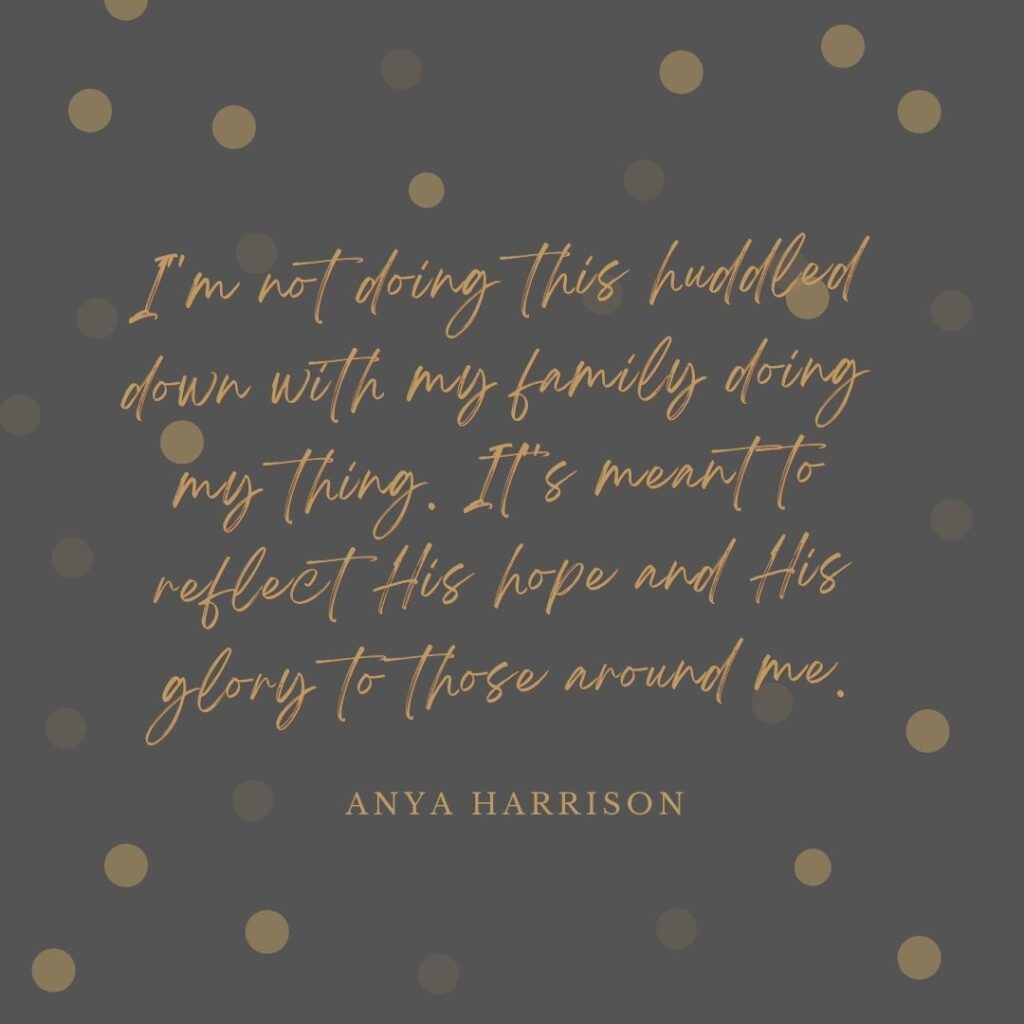
Links and Resources
On the Incarnation by St. Athanasius
Little white porcelain candle houses
The Life Giving Home by Sally Clarkson
Jotham’s Journey by Arnold Ytreeide
Ishtar’s Odyssey by Arnold Ytreeide
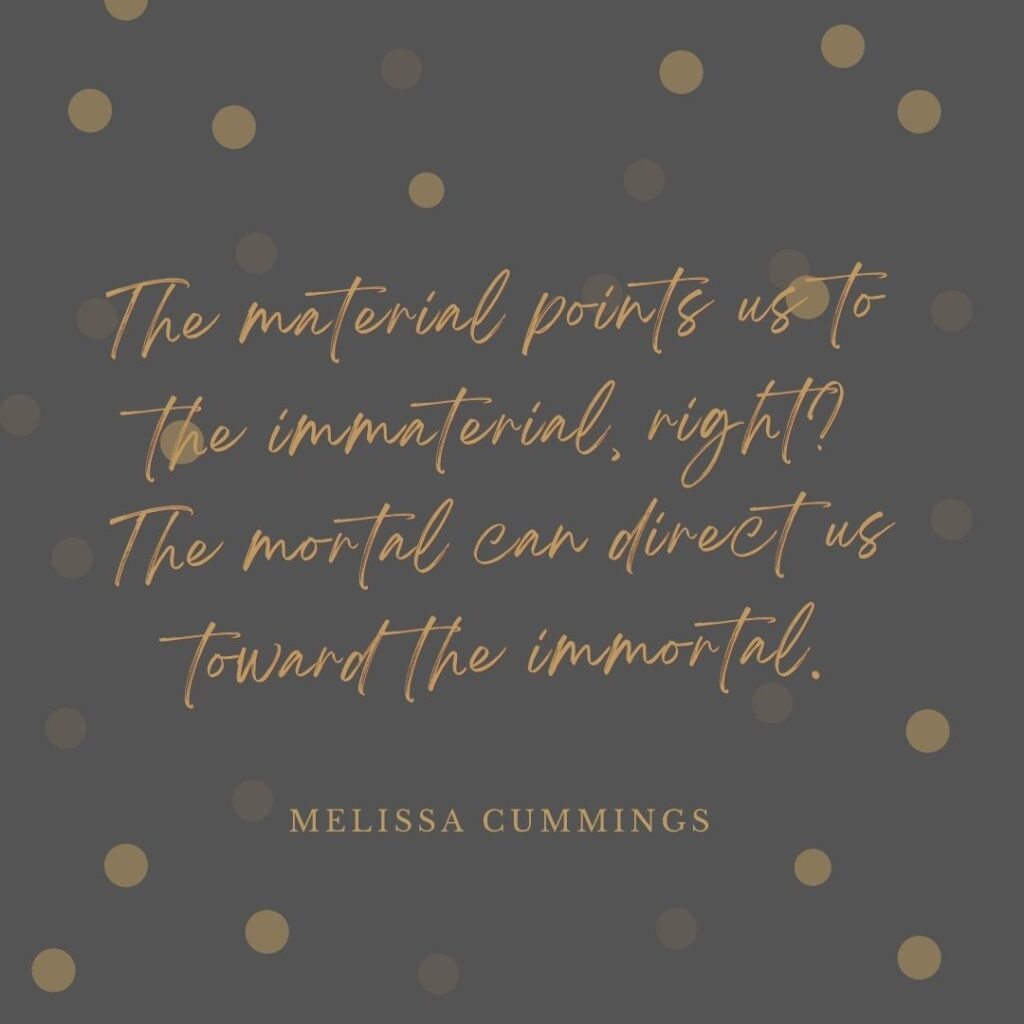
Episode Transcript
Melissa: joining me today for this paideia conversation is Anya Harrison from Paideia Southeast. This is the second half of our conversation about Incarnation and Advent as we continue to practice, pursue, and implement paideia. Last time we chatted, Anya and I had the delight of talking about St. Athanasius’ book On the Incarnation. We shared some of the ways that it has blessed us and challenged us – I know I particularly shared the way that it just gives me mental gymnastics and basically blows my mind. [laughter] This time, we are jumping into different traditions which point us back to the truth of the incarnation. We hope you enjoy listening in, and would love to hear back from you. What are some of the traditions that your family has enjoyed, and why? How do your traditions point you and your children to the truth of Who Christ is – Son of God, Son of Man, the Incarnate Deity?
“It Is as if Infancy Were the Whole of Incarnation” by Madeleine L’Engle
This time of the year, the newborn child is everywhere
Planted in Madonna’s arms, hay-mows, stables
In palaces or farms or quaintly under snowed gables.
Gothic, angular, or Baroque-plump,
Naked or elaborately swathed,
Encircled by della robia wreaths,
Garnished with whimsical partridges and pears, drummers and drums
Lit by oversize stars
Partnered with lambs, peace-doves, sugar plums, bells, plastic camels in sets of three,
As if these were what we needed for eternity.
But Jesus the Man is not to be seen.
There are some who are wary these days of beards and sandaled feet
Yet if we celebrate, let it be that He has invaded our lives with purpose,
Striding over our picturesque traditions,
Our shallow sentiment,
Overturning our cash registers, wielding His peace like a sword,
Rescuing us into reality, demanding much more than the milk and the softness and the mother-warmth of the Baby in the storefront creche.
Only the Man would ask all of each of us.
Reaching out always urgently with strong, effective love,
Only the Man would give His life and live again for love of us.
O, come – let us adore Him! Christ, the Lord.
Melissa: you know, that idea of truth informing tradition but not prescribing tradition – how are some ways that you have found joy in tradition that maybe is informed by your understanding of Incarnation that’s just personal to you and your family?
Anya: so I won’t repeat my disclaimer. We’ll just assume everyone heard that.
Melissa: yeah.
Anya: so, we… I love the aspect of the Incarnation interrupting our darkness and our mess, and I love the imagery that we have from John the Baptist of a light in the darkness, and Jesus obviously I am the light of the world, and all of the… I love all of the, those, that imagery. And so one of our favorite things to do… and also just to kind of cover general concept of Advent, it’s this time of waiting and preparing. One, we remember His first coming of course, and we’re also waiting for a second coming. And that second, that waiting for a second coming, and preparing our hearts through repentance for a second coming, I don’t feel like I grasped that layer of Advent in the beginning, right? You know, like, I understood the first part – oh, were remembering, and you’ve got Advent calendars that start on December first even though the Church Calendar starts at, you know, the fourth Sunday before, you know. So everybody kind of works this out differently, but I think that one of our favorite things to do is, I don’t have like a Christmas village or any of those things that generally get built up in families over time, but I did take three or four years and collect little white ceramic, like little white candle houses. You know, where you put a candle in it and it lights out the windows. And so I have one for every day of Advent, and every night or every morning I hide it with two little chocolate mints somewhere in the house, and they go hunting for it, and when they find it you know they get to eat their chocolate and then they put… we start collecting these houses. And on Christmas Eve, they find the last one which is not a white house, it’s like a little concrete house that we put a candle in it, so it’s meant to represent the humility of the manger and the humility of the Incarnation and that Christ came really in humble circumstances. And then on Christmas Eve when we come back from the candlelight Christmas Eve service, we don’t turn any lights on in the house and we only – we’ll have prepped it beforehand; the first year I didn’t do this, and it was like really hard for me to find all the candles [laughter] to light it in the dark. So now we’ve learned to have all the candles prepared before we go. And I will have made a soup earlier in the day, and we lay out a blanket on our living room rug, we light all of the candles, and so the only light in the house are candles in these little houses. And we sit on the blanket and we eat soup and bread, and my husband reads, you know, the story of Christ’s birth. And we usually cry a little bit and we talk about how, you know, even in the darkest places, the light shines. And it invades the darkness! And this is what Jesus did to us: He came and interrupted us in our darkness, and He brought what none of us had. You know. None of us are the light of the world, right? Like, He came in and brought what we all desperately lacked, and now that He is here and now that He dwells in us, like, we light the way. And this year, I haven’t been in years past, but reading through… my last lap through the Gospels really brought me in Matthew 25 to the parable of the ten, the ten virgins, and how they head out waiting for their bridegroom but only five of them were prepared and only five of them were really waiting, and the other five were like, oh he’s been a while. And they all fall asleep and then when he comes, five of them have oil for their lamps but the other five don’t. And so this year we’re gonna add reading that parable, just as that reminder of like, we, let us not forget that He is coming again, and let us not fail to prepare our hearts daily and hourly and regularly, continually coming back to the cross and being cleansed regularly, confessing our sins, repenting of our sins, receiving forgiveness. Because otherwise it’s almost like, we aren’t going to want to be the city on a hill. You know, if… we can’t even be the city on the hill if we’re running back to the oil that we failed to bring with us. And so that’s one of our favorite traditions. Actually, the meal on, the picnic on Christmas Eve was Sally Clarkson – she calls it the shepherds’ meal from the book, Life Giving Home.
Melissa: I thought it sounded familiar when you said that.
Anya: yeah, we got that from there, and then we added the candles and the houses. And it’s so beautiful, because it’s hard to take kids away from the presents. You know, you don’t want to. Like, presents are good. I’m not trying to ruin that, but I’ll tell you what, my kids come back from the Christmas Eve service, and we… just the atmosphere of the dark home, and we light the candles, and they sit down, and there aren’t any presents opened. And I don’t want to, I don’t have a problem with someone who does, right? It’s just, we go into bed thinking of the birth of Christ, you know. And we go to bed refilled with the hope that we are never without Him, we are never hopeless, we are never out in the dark alone. But He came and He interrupted all of it. And then we’re excited of course about Christmas morning. So.
Melissa: I love that.

Anya: I have some others, I don’t know if you want me to just keep going.
Melissa: so that idea of the little houses – is that… did you come up with that because of the idea of a city set on a hill?
Anya: I love lighthouses in general. I grew up on the coast of Lake Michigan, and I’ve, you know, I could walk out about thirty steps from my house and see a lighthouse, and I, when I was a young mom, I wasn’t even that young, but like a new mom and I felt very young at the time – I really wrestled heavily with how to do what I didn’t know how to do. Right? Like, I didn’t feel like I had a lot I could look back on in terms of the Christian aspect of raising my children, and so the concept of being a lighthouse has been a picture for me for a long time. And I often think of, even, I wouldn’t even say my home, my home belongs to the Lord, and it’s intended to be a lighthouse. And that a lighthouse, you know, is literally helping the sailors in the boats try to figure out, like, where do we go? What do I do? I’m lost, you know. And we, I want my home to be a place of hope in Christ. You know, like I want it to be extending beyond the borders of my walls, which is something… I’m an introvert, and I don’t necessarily want to put myself out beyond the borders of my walls… but it doesn’t matter because He’s commanded me to. And so in some ways that’s a gentle reminder of me, to me of the fact that He really did say, like, you don’t light a lamp and put it under a bowl. You know, like your house belongs to Me, your life belongs to Me, like your children belong to Me, your family belongs to me, and I have created all of it for My glory. So you don’t get to shutter the windows, you don’t get to keep people out, and… yeah. So I remember walking into a candle store one, I don’t know, during some holiday shopping, and there were two or three of them, and I bought – they were all like seventy five percent off or something, and I bought them. And I had this moment at the, like, I want to get one for every day of Advent. And it took me a few years to find them. So there’s like a variety, and yeah, and it, I would like, whenever… one time Target had some, and a friend posted some randomly on her Instagram and I was like, where did you find those because I’m like four short and I need them. And I drove like an hour to go and get the others! And now it’s wonderful because I’m not longer having to shop for them, we can just pull them out and light them. But I think the idea of the lighthouse is a picture that I often have, it’s an imagery that God uses in my heart to really remind me of what He’s asked me to do as a mom, as a wife, as a Christian. You know, but I’m not doing this huddled down with my family doing my thing. It’s meant to reflect His hope and His glory to those around me.
Melissa: I think that is so beautiful. You said you have more – you have more…?
Anya: when we, I guess some of it is actually now that I think about it, it’s a lot of the same themes that I apply to other aspects. Right? When we put up our decorations on the outside of our house, we put wreaths in the window and everything and then we put out little candles, just like one candle in each window, and they’re set so that when we turn them on they’re lit for six hours or something. So we always have them turned so that as the sun goes down, the light goes on, you know. And they’re just little, but I love the fact that those little lights, you can still see from the road. So it’s like, whenever I’m like practicing them for the year of like, okay we’re turning these on, whenever I’m doing it, I think to myself, these are not gonna be bright enough. Maybe I need new batteries or maybe I need to replace these. But then they do, you put them in the window and when the sun goes down, you see it. You know, I even, I think about the one star that the magi followed. They would have had to follow at night, you know, because they wouldn’t have seen it during the day. And that’s not how they normally traveled, they would travel during the day because it’s much safer. But you can’t see the star except against the darkness of the sky, you know, and so I think as Christians that when I light those little candles, you know, and we talk about how we as believers are meant to shine like stars in the universe you know, and being different than those around us, and Christ came to be the light of the world who dwells in us, and so here we are. You know. And we’re putting it in our window. So it’s really the same, it’s the same concept for me there on that one.
We do a Sabbath… you guys do a Saturday night before Advent Sabbath meal, right? Like a special meal the Saturday before?
Melissa: yeah, it’s in my little family now, yeah that’s what we do because it’s our fanciest meal of the week, and it’s too much for the Lord’s Day. [laughter] So it’s sort of my family culture. We don’t do that year round. I know plenty of people who do that year round. But I definitely do that during Advent, yeah, it’s our kickoff into the Lord’s Day.
Anya: yeah, well you know, we figure in Jewish day, evening and morning, it is that. Right, like you’re kicking off the Sabbath the night before. So we do, we’ve talked about this outside of the podcast, but we do a fancy candlelit… I’m all about the candles during Advent time… we do like a fancy dinner – cloth napkins, candle lit, the food isn’t always necessarily fancy, but all you have to do is put it on fancy things and the kids think it’s fancy – on Sundays of Advent and I think that throughout the year we don’t, we don’t do big Sabbath dinners either. I think we would love to at some point, we just haven’t figured out quite how that fits. And I’m, I don’t feel the need to, others, I love the fact that everybody does things differently, you know. So in general, it fits right for our family. We feel like we are lacking it, I don’t think we would add it. But I love it, and I’ve thought about adding it. But we do it during Advent as well, and it feels like a preparation for Christmas. Right? Like it feels like we’re building up. Like it’s not as big as the big Christmas meal, but Christmas is coming. You know. And so it’s that reminder of like, we’re waiting for the big feast. Which feasting is so biblical, you know, like feasting and fasting is biblical too. And there has to be a distinction between the two or it gets all muddied and we lost their application, you know? But I think about the idea of like preparing a fancy little feasts in preparation for the Christmas feast. A fancy little feast is very much like what we as Christians are doing as we await the supper of the Lamb, you know, and as Christ came, and as they waited for Him and He came and He’s coming again! And I desperately want my children not just to grasp the fact that Jesus was born in a manger but the fact that Jesus reigns on high and is coming again. And so I think all of those things that look forward to it, like, we do Advent readings… which I hesitate to mention because it would, some would be very uncomfortable with it, but I will anyway because I’ve talked about freedom of conscience. We… there’s a series like Jotham’s Journey and there’s four books… I would call them biblical fiction, okay, so it is not the Word of God, and some would be uncomfortable with the, like the liberty that the author took to interweave biblical characters into the story. But you know, yesterday at the end of our reading we’re reading right now about, the character we’re following is the son of one of the magi. And so it ended in this very suspenseful way, and my daughter was like, what is it? what’s next?! And I’m like, no! And she’s like trying to sneak over my shoulder and I’m closing that book and I was like, no no no no no. And she’s like, I’m gonna wake up early and read it in the morning. And I’m like, no you’re not because we will wait and we will wait patiently, and there’s a time for this and there’s a time for that and it’s tomorrow and we do not think that, like, we can just have everything whenever we want. And I think that that’s the whole thing with Christmas too, like, my kids – if they find their gifts, they don’t get them. And I had to enforce it one time and I never had to enforce it again and there were tears, but my son accidentally stumbled upon something when he was like five years old. And he knew the rule, and I was like, you don’t even look. Don’t even look because if you find them you don’t get them. And sometimes I’ll not hide it very well in my closet, and my closet door will be open and my son will be like, Mom!! and he’s like covering with his hands and he’s walking past and he’s like, close your closet door!! But that idea of waiting: what’s not yet here is not yet here, you know, and so we as Christians are still anticipating His return. And I think the waiting is so key! It’s so important. Like I want my kids to wait. I want them to get excited and to feel what it feels like to anticipate. Because that is our reality as believers, you know, like we are anticipating His return. And so yeah, we have lots of rules on there’s nothing done before the proper time. [laughter] Or there’s grave consequences.
Melissa: that’s something to… the material aspect of Incarnation. And it’s a little bit edgy to use that word, material. And when we’re in a season where as, especially as Christians I think, we fight to be countercultural when it comes to commercialism, which is manifest in materialism in some… to some extent, and yet, I think for my family – again, a freedom of conscience thing – my family loves celebrating the birth of Christ with material things in order to point us to the physicality of Jesus’ birth. That idea that gifts are… like, if you ask your children, what are you most excited and waiting for for Christmas… in most cases, especially the younger they are, they’re going to say, the presents! Right? The gifts. And that’s something that can make us feel uncomfortable as though, oh, that wasn’t the right answer, that’s not spiritual enough. And yet…
Anya: right? Take away the gifts! [laughter]
Melissa: and yet, right, it’s exactly the right answer. In my perspective, it is exactly the right answer. Because Jesus taught us in parables and pictures, and I love to think of gifts for my children as parables and pictures. So right now, they see, it’s a gift from you know Mommy and Daddy. But when they get older, maybe it will draw their eyes to the Ultimate Gift-Giver. The material points us to the immaterial, right? The mortal can direct us toward the immortal. But that idea of gifts and the material side of things, even the lights that you’re talking about, the candles – all of that, they’re parabolic! Is that the right word? [laughter] They’re parables.
Anya: absolutely, I think so. Yeah. Well, and it’s also, we see it in the Jewish feasts too. There’s a reason that God gave the Jews specific, tangible foods to eat on certain days and places to sleep, right, like the Feast of Tabernacles. Yes, they put a tent outside and you’re gonna cover it with the things from the harvest. Like, because we’re, He made us in a body. Like, we, He made a physical world and He made physical people. And this like, this physical world with physical people was not an effect of the fall, it was the original design. You know? And so our celebration should be in the physical world. And there, I remember, I’ve wrestled with that as well, the materialism side of the ditch, right. And not wanting to be a scrooge on the other side. But also not wanting it to distract in all of these things. And I really just think that if we are starting at glorifying the Lord, then you can’t – I know we’ve talked about this – you can’t overdo Christmas. You can’t make too big of a deal out of it, because there isn’t a bigger deal out there to celebrate. So like you can’t, you can’t do too much, you know, and at the same time, it’s been down. And so in another aspect, you need do nothing, right? So like we have the freedom to celebrate it lavishly. And we also have the freedom to just sit in awe of it, and if ultimately it is for the glory of the Lord, you can’t mess it up and at the same time if it is not for the glory of Lord, then even the little bit is done unto nothing. You know what I’m saying? Like, and that’s, you know we can feel it. Like we can feel it when we go to a Christmas party that may be a work party for somebody who’s working outside of a Christmas setting and they go to a Christmas party. And they’ve got the music and they’ve got the food, and it’s sort of like, what are we celebrating? [laughter] Like I’m sort of like, I’m sure that we’re missing something. I’m really not sure why we’re all here. [laughter] And that’s it is like… yeah.
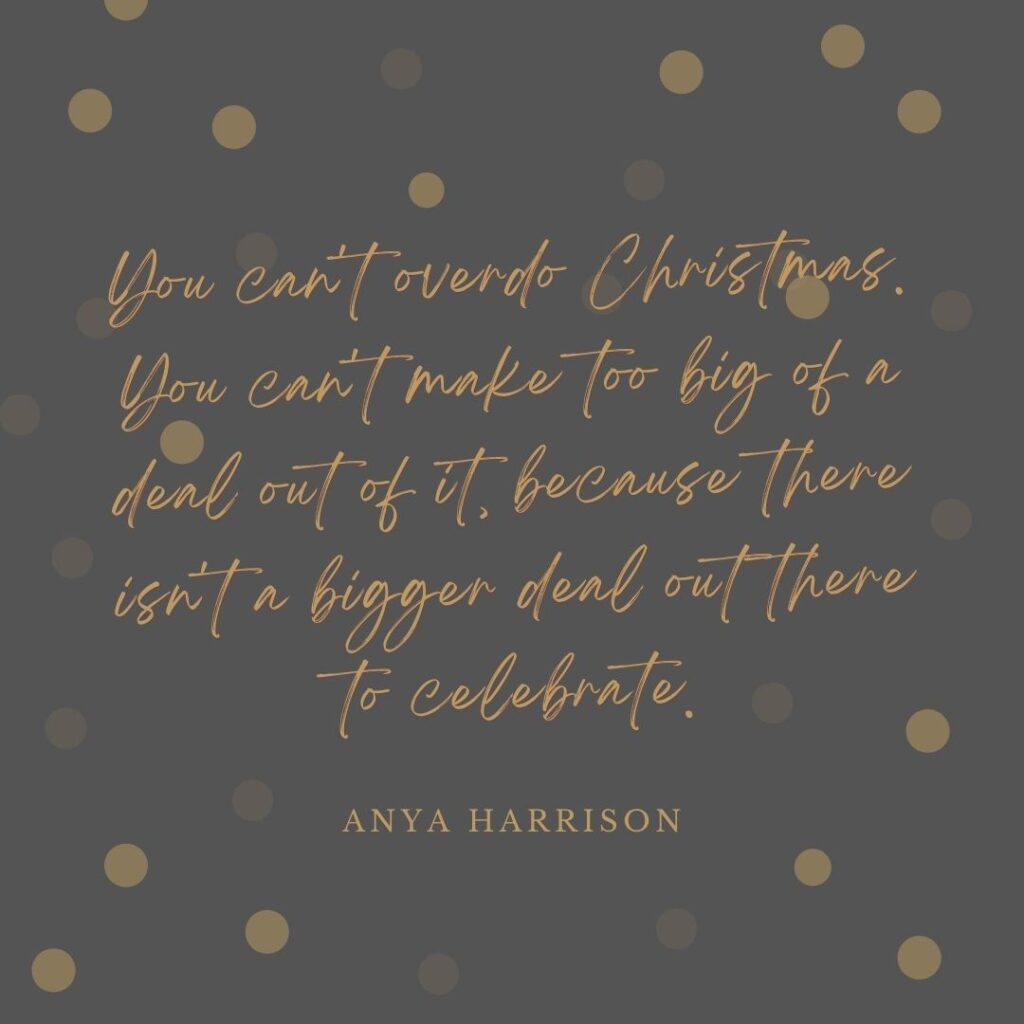
Melissa: we have an Epiphany dinner with friends. And then we have – we’ve never done this yet – but we have friends who take down their Christmas tree on Epiphany, and they have a bonfire. And it’s this huge bonfire that you can see because they burn it with other things, it’s not just the tree I think, but it’s this picture of the light coming to the Gentiles. And so…
Anya: amen! Oh I love that! I might add that this year.
Melissa: burning that tree!
Anya: that’s resonating with me.
Melissa: so we haven’t done that yet. I don’t know why we’ve never done that. I feel like we should.
Anya: you know, I take that as a moment just to mention to anybody listening that, sometimes you can hear all these great ideas and think, oh, I’m not doing all of that yet. None of us is, are doing all of the things we look forward to doing, right. Traditions are built over time. Even like, I didn’t have all the houses at first, I think the first year I had three and then I had like ten, and then I maybe hung out at like twelve because I didn’t have the budget… like, it took time to build it up, and then, we, it’s the same thing as like, you can’t, if your heart is right you can’t mess it up. And you’re not missing out if you’re not observing all of these things. And they really do build them with time. You know, and when one feels right and it feels right to add another, then it’s in its proper place, you know. But when we feel like, oh, I have to do this. Like if I had year where I didn’t have the time to roll out all that gingerbread, you know, we just wouldn’t do gingerbread houses, you know? But when I am able to prepare for it, then it’s a wonderful time. And my kids decorate these houses for days and it’s lovely because I’m doing other things, and it’s like, it belongs and it fits. So for anybody feeling like, oh I’m not doing this and I’m not doing that… well, none of us are doing all of it. You can’t do all of it. You’re not supposed to. It’s like, yeah, if our hearts are right, then, onward! And as you’re able, as is good for your family, as is glorifying to the Lord and not a burden, you know.
Melissa: yeah, amen.
Anya: but that bonfire is happening in my house this year. It’s official.
Melissa: doesn’t that sound like fun? [laughter]
Anya: oh my husband’s gonna love it, he’s gonna be like, yes! And I tell you what, Christmas trees burn up, man. They like, they, we burn ours normally anyway, but it was never, it never had any significance and it was never at a specific time. Until this year, Melissa, thank you! It’s gonna happen. [laughter]
Melissa: well, like I said, I took that from some friends of ours. Every year I say, we’re gonna do that on Epiphany. And we take down our decorations on Epiphany, we take down the tree, but we haven’t actually done the bonfire part. So, you and I both, maybe we’ll try that this year.
Anya: yep, yeah, we’ll send each other photos.
Melissa: there we go, accountability!
Anya: yeah, I love it.
Melissa: so before I let you go, are there any other pieces that you wish you had mentioned or questions that you wish I had asked?
Anya: I think the encouragement at this time for those who observe this specific time period, which obviously we’re talking about it, so we do… is to recognize where it all comes from and that we wouldn’t be attaching… I would hate to outsource lifeless traditions. For if all the world had candles in their windows but didn’t know the Light of the world, then what good is it? Right? And we’re just whitewashed tombs and it becomes another pharisaical thing. And to think of, maybe, a young mom who feels like their hands are full maybe… I just especially think of right now, I’ve got… I have friends who are, you know, they’re pregnant, they’re adding another child to their family in the next few weeks, they’ve, they’re sick, covid is everywhere, no one’s gonna be able to visit them in the hospital because you know, they’re not vaccinated you know, all of these trigger words [laughter] but all of these things that complicate everything. Right? Like my great uncle and great aunt both of covid, one is hospitalized right now, and they live far away from me so I can’t visit them but I’m like, there is heaviness right now that’s happening. And what to do with feasting and celebrating in the midst of heaviness, right, I think that some, it can… if people perceive these traditions and these celebrations and these practices that we do to remind ourselves of the miracle of the Incarnation, they perceive it as something that Christians have to do, well then it becomes a burden, you know. And then it becomes this crushing weight on top of an already crushing circumstances for some. And yet if we start at Emmanuel, you know if we start with like, God with us in the midst of it, in the midst of covid, in the midst of maybe job loss, in the midst of sickness or family brokenness or addiction or depression or anxiety… I’m like, these are all things that are happening in my very near circles, you know, right now. And if we start at Emmanuel, then that frees us up to celebrate because we are celebrating the hope that came into the darkness. But if we start at the traditions, then aren’t we a sorry bunch? You know. Because now we are tired and weary and spending money we don’t have, to buy little ceramic houses because someone once did that and thought it was really cute, and instead now we’re fighting with our husband because we spent the money we should have spent on the Christmas Eve dinner on little silhouette houses. You know what I’m saying? Whereas if we are starting at Emmanuel, then we walk in freedom and we know that if we don’t get the tree up this year… I have a friend who’s moving because of a job situation because of covid, and they didn’t get a tree this year, you know. And that doesn’t change Emmanuel. You know, like, that doesn’t change God with us. And that doesn’t change Christ coming into our darkness. And so I would just want to emphasize… and that’s also where, there’s no disunity among Emmanuel either. Like there’s no bristling and offending one another about how we are celebrating Emmanuel if we start there. And so my encouragement would just be, before wanting to buy the ribbons or the candles or the wreaths or a certain book or anything, like, unless its the Bible – buy the Bible – come to that place of like embracing, receiving, and like celebrating the Incarnation that God came down in the midst of us and He became one of us. Because that is the only place we find our strength to face, and to then, to celebrate. Like that is where our hope lies, and the Enemy is the sneaky one, you know? And our flesh is too. And it’s like, you find so much protection from comparing, from coveting what how somebody else does it, from the guilt of feeling like oh I didn’t make my pie as good as my mom made – all of it goes away when we’re sitting, when the foundation for everything is Christ the Son of God, the Son of Man, come to rescue us. Because that, no one can take away, no one can rob us of. And again, then you can put whatever tradition you want on that, and to God be the glory, you know. But without it, it’s a heavy burden.
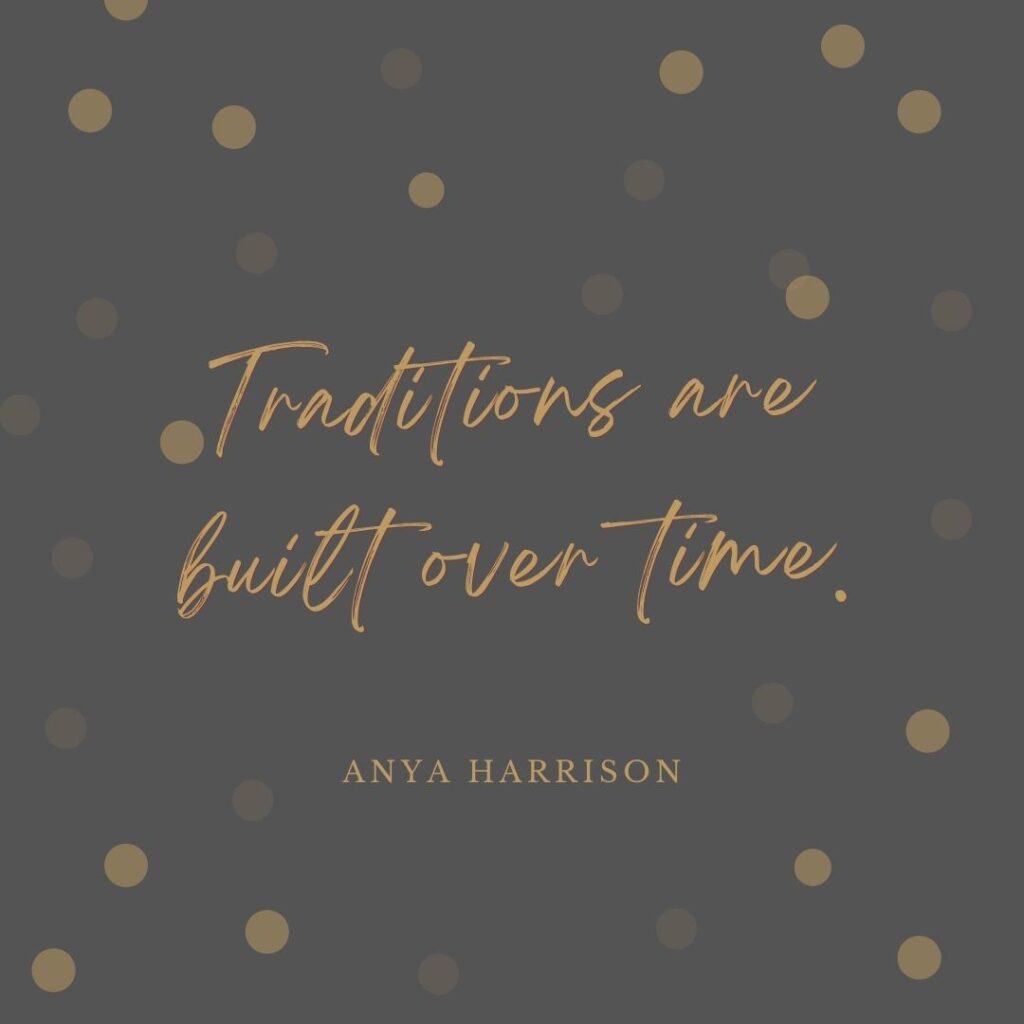
Melissa: amen. That’s encouragement, indeed! Let me tell you.
Anya: because we all get tired. [laughter] Oh I have one more thought that I think could be helpful. I was reading an article, or I don’t know if it was from a podcast, I don’t know. It may have even been years ago. But it was talking about the difference between unbiblical and nonbiblical. And this is a very practical piece after, you know, yeah. And how much of the tradition is nonbiblical – meaning, it’s not included in Scripture, right, like very different from the Passover. We’re told how the Jews were to celebrate the Passover. We’re not told if or how or when or any of the how we should do things to remember… beyond, obviously like Communion, you know, the Lord’s Supper and things like, you know we have those things. But when it comes to seasonal things, we don’t have anything. But just because it’s nonbiblical doesn’t make it unbiblical. And at the same time, some things are unbiblical, right? So something – there’s a difference in being against the Bible and not being part of the Bible. And so I think that in terms of that freedom of conscience, like informing somebody who’s like struggling with, well I don’t know, is this okay, is it not okay, I grew up with it, it was really sweet… you know, if it’s nonbiblical just because it’s not included, you know, the Bible also doesn’t tell us to brush our teeth, but I recommend it. [laughter] But there’s just, there’s a lot of things that we have the freedom to do and can do and it’s good to do. And then there’s things that we should not do. So I’ll give an example of something we should not do. Ah, like the magi followed a star, right? Why? Because they studied the stars and these days it’s really trendy… like astrology and horoscopes, and I’m like blown away at how that trend is like sweeping into the church, and I’m like, oh, um, what in the world. You know, like, how did we go from worshipping the Creator of the stars to looking to the stars for our hope or our whatever? And the moon and all this stuff, like, that’s unbiblical, because the Bible clearly states that we do not participate in astrology. Because that God chose to declare the birth of His Son in the heavens does not mean that we look to the heavens for our hope. We look to the Maker of the heavens. So that would be an unbiblical thing to do! Versus a nonbiblical, which there’s a gajillion examples of what that could look like. So I think just that practical side of distinguishing. And I would always say, never go against your conscience, you know, never ever ever. So even if somebody else feels free to do something and you don’t, then rest it there.
Melissa: I would bring this back to St. Athanasius who said about the Word of God in human being, “He was not bound to the body but rather was Himself wielding it so that He was both in it and in everything, and was outside everything and at rest in the Father alone. And the most wonderful thing was that He both sojourned as a human being and as the Word begot life in everything and as Son was with the Father.” Wielding the body, in it, in everything, He sojourned and yet begot life in everything… just going back to that mind-blowing reality and grateful that someone like Athanasius could put into words what I can barely begin to grasp and yet we can talk about it, we can laugh about it and cry about it, and find ways to glorify God in how we walk through the physicality and the daily things of celebrating and remembering that He did come, and looking forward to Him coming again. I think that just sort of, that sums it up! That wielding of the body.
Anya: yeah, it does. It acknowledges His deity and His humanity, which is where our hope… He needs them both or we are without hope. Hope that He was them both and so we are not without hope, you know? Thank you for this, Melissa. I’m just really encouraged and have loved discussing this with you.
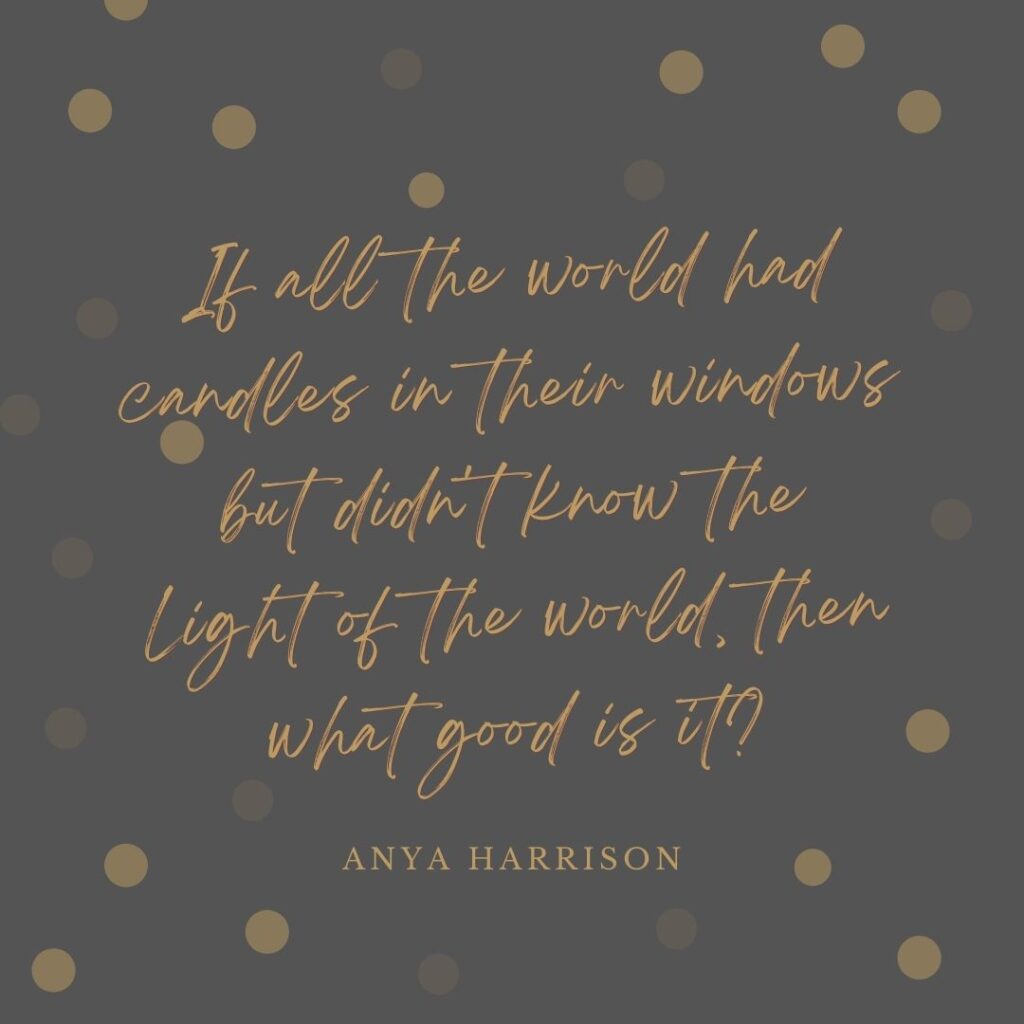
Melissa: I’m just so glad that we were able to take the time to do it. So I’m grateful for the work you’re doing with the whole Paideia Southeast team. It fills my sails and it helps me to have encouragement for work here, even though you’re far away, it helps me where I am.
Anya: well, thanks for leading the way on that one. Because there would be no Paideia Southeast without a Paideia Northwest, that’s for sure.
Melissa: well, God has worked some great things and I’m excited to see how He continues to do it.
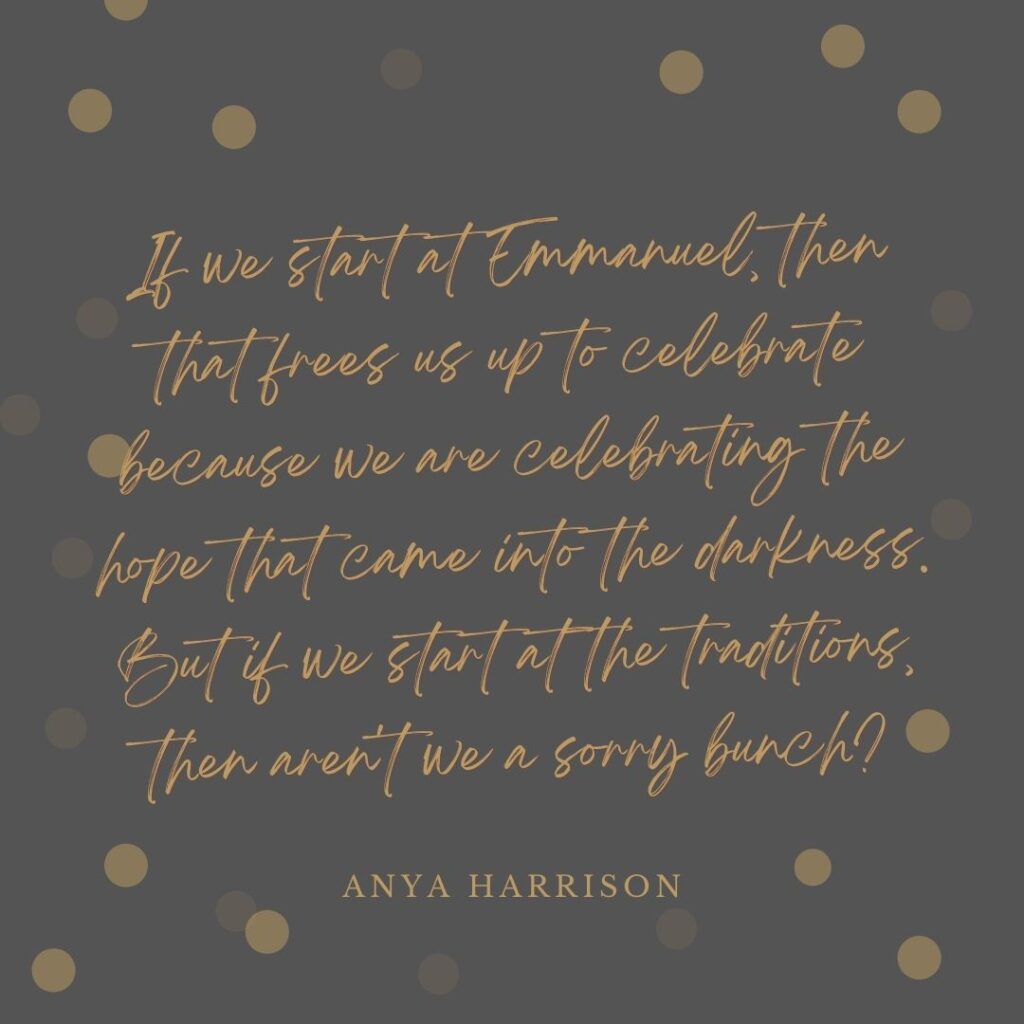
“Love’s Incarnate Birth” by Madeleine L’Engle
Observe and contemplate.
Make real. Bring to be.
Because we note the falling tree
The sound is truly heard.
Look! The sunrise! Wait —
It needs us to look, to see,
To hear, and speak the Word.
Observe and contemplate.
The cosmos and our little earth.
Observing, we affirm the worth
Of sun and stars and light unfurled.
So, let us, seeing, celebrate
The glory of Love’s incarnate birth
And sing its joy to all the world.
Observe and contemplate
Make real. Affirm. Say Yes,
And in this season sing and bless
Wind, ice, snow; rabbit and bird;
Comet and quark; things small and great.
Oh, observe and joyfully confess
The birth of Love’s most lovely Word.
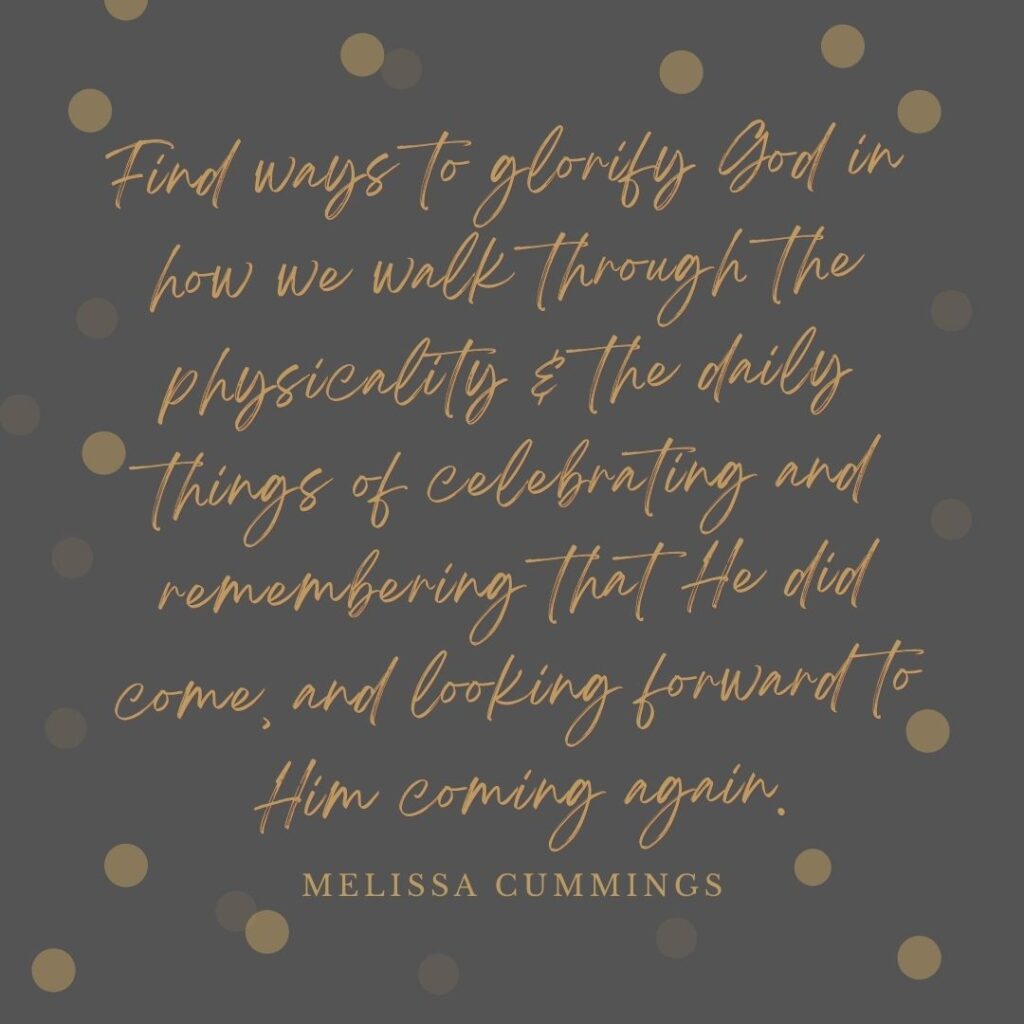
Melissa: and that brings today’s conversation to a close. You can find more conversations on paideia at PaideiaNorthwest.com and PaideiaSoutheast.com for more resources and practical encouragement. Join me again next time for another paideia conversation, and in the meantime, peace be with you.
